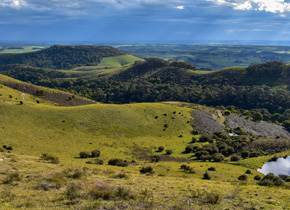Media releases
Using dried human waste to boost grain production
Posted: Wednesday 22 April 2020
Federation University Australia researchers are trialling the use of a new material obtained from human waste to improve soil fertility and increase crop productivity in Victorian grain-growing regions.
Biosolids are obtained from dried sewage and are freely available from state water corporations.
The research, funded by a Grain Research Development Corporation (GRDC) grant, will help determine whether biosolids can be used as a possible solution to the significant subsoil issues hampering the Victorian grain industry.
Previous work shows that up to 80 per cent of soils in Victoria’s grain-growing regions have major physical and chemical constraints that significantly reduce crop productivity. The use of biosolids aims to fix these issues and boost grain production.
Preliminary trials last year at Balliang in Victoria’s medium rainfall zone showed plots that had deep subsoil manuring with biosolids yielded a 55 per cent increase in cereal grain production compared to untreated plots.
In a separate trial at Ballan in Victoria’s high rainfall zone, deep placement of biosolids in the soil produced a 65 per cent yield increase in cereal grains compared to the untreated control treatment.
The GRDC-funded research project will build on these interim results and further increase understanding of the mechanisms behind the significant crop enhancement and the longevity of the benefits.
As well as boosting grain production, the project has the potential to deliver Victorian farmers significant savings through the use of biosolids as a manuring agent. Biosolid material is available for free from state water corporations, compared with prices of up to $200 a tonne for chicken manure, $1,550 per tonne for lucerne pellets, $400 per tonne for wheat stubble and $450 per tonne for pea straw.
Quotes attributable to Federation University’s Professor Singarayer Florentine
“This work to understand the benefit of biosolids to the agriculture industry has both fundamental knowledge implications to do with soil dynamics, and significant economic advantages for participating farmers”.
Quotes attributable to Federation University’s Dr Nimesha Fernando
“What is clear from these trials is that re-engineering poor Victorian subsoils with biosolids substantially changes the soil’s physicochemical properties and soil water dynamics. This seems to provide ideal conditions for the crops to flourish more strongly and to produce higher grain yields.”
Quotes attributable to GRDC’s Program Leader, Dr Stephen Loss
“We’ve been working on applying organic matter to subsoils in the grains industry for 12 years in earlier projects, but this is the first time we’ve used human waste as one of the organic matter sources to overcome subsoil constraints. Initial crop response to biosolids has been promising.”
Quotes attributable to, Senior Research and Planning Scientist at South East Water, Dr Aravind Surapaneni
“Using biosolids in subsoil manuring will be a game-changer in the grain industry”.
| Contact | Stephanie Charalambous Media and Communications Advisor 0429 360 727 s.charalambous@federation.edu.au |
|---|